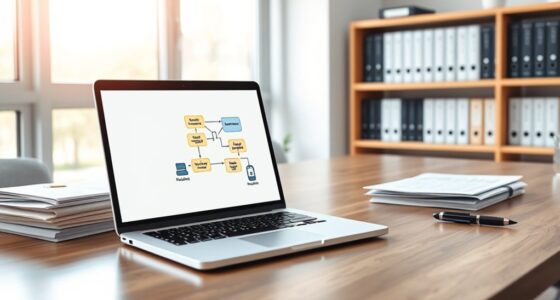Privacy and anonymity both protect your online presence, but they serve different purposes. Privacy helps you control what personal information you share and how it’s used, giving you security over your data. Anonymity, on the other hand, lets you perform activities without revealing your identity, making it impossible to trace actions back to you. Understanding these differences can help you better safeguard your digital life as you explore how each works.
Key Takeaways
- Privacy controls what personal information is shared and how it’s used, while anonymity ensures actions cannot be linked to an individual’s identity.
- Privacy shields personal data from public view, whereas anonymity removes identifiers to prevent tracking or identification.
- Privacy allows for data control within digital environments; anonymity eliminates the connection between actions and a real person.
- Privacy protects your personal details from exposure; anonymity hides your identity altogether during online activities.
- Both serve distinct roles: privacy manages information sharing, and anonymity focuses on concealing identity from being associated with actions.

In today’s digital world, privacy and anonymity are often seen as interchangeable, but they serve distinct purposes and come with different implications. When you think about your online activities, it’s important to understand how your digital footprints impact your ability to protect your identity. Privacy focuses on controlling what personal information you share and how it’s used, allowing you to keep certain details away from public view. Anonymity, on the other hand, lets you operate without revealing your identity at all. While privacy offers a shield for your personal data, anonymity is about removing identifiers so that your actions can’t be traced back to you.
Your digital footprints—the trail of data you leave behind every time you browse websites, make transactions, or post on social media—are central to the debate between privacy and anonymity. If you don’t manage your digital footprints carefully, you risk exposing sensitive information that could be used to identify or track you. For example, sharing your location, phone number, or even your interests can make it easier for someone to piece together your identity. Privacy tools like encryption, privacy settings, and data minimization give you control over what info you reveal, helping you protect your digital footprint and, consequently, your identity.
However, even if you’re vigilant about maintaining privacy, your online actions can still be linked back to you unless you take extra steps to stay anonymous. Anonymity ensures that your activities are not tied to your real identity, which can be vital in sensitive situations—like whistleblowing, activism, or simply browsing without targeted ads. To achieve true anonymity, you might use tools like VPNs, Tor browsers, or pseudonymous accounts. These tools mask your IP address and other identifiers, making it difficult for anyone to connect your actions to who you are. Additionally, understanding how STEM Toys support early cognitive development can encourage children to explore safe and creative ways to learn online.
The key difference lies in intent: privacy is about safeguarding your personal info within the digital environment, giving you control over what’s shared and seen. Anonymity, meanwhile, is about removing your identity altogether, so your actions can’t be linked back to you at all. Both serve important roles, but they’re not interchangeable. Protecting your digital footprints and practicing identity protection through privacy measures can help you control what information is accessible, but if you need to stay completely anonymous, you must go beyond privacy tools. Recognizing these distinctions helps you make informed choices about how to navigate the digital landscape safely and confidently.
Frequently Asked Questions
Can Privacy Be Maintained Without Complete Anonymity?
You can maintain privacy without complete anonymity by using data encryption and identity concealment techniques. Encryption protects your data from unauthorized access, ensuring your information stays private even if your identity isn’t fully hidden. Identity concealment methods, like pseudonyms or VPNs, help prevent others from linking your activities to your real identity. This way, you control what information is shared while still maintaining privacy, even if you’re not completely anonymous.
How Does Government Surveillance Affect Personal Privacy?
Government gaze grants a grim glimpse into your private life through widespread surveillance, raising serious concern about data collection and surveillance ethics. You’re often unaware of the extent to which authorities monitor your movements and messages. This pervasive prying erodes personal privacy, prompting you to question how much control you truly retain. Ultimately, government surveillance sacrifices your privacy at the altar of security, challenging your rights and your trust in institutions.
Are Anonymity Tools Legal in All Countries?
You might wonder if anonymity tools are legal worldwide. While many countries permit cryptography techniques for privacy, some restrict or ban certain tools to control digital footprints. Laws vary, so you should check local regulations before using anonymity tools. In some places, using these tools can be illegal or require government approval. Always stay informed to protect yourself and respect your country’s legal boundaries.
What Are the Risks of Sacrificing Privacy for Anonymity?
When you sacrifice privacy for anonymity, you risk exposure to data breaches and social engineering attacks. Without privacy safeguards, your personal information becomes vulnerable, making it easier for cybercriminals to target you with scams or steal your data. Anonymity might protect your identity, but it doesn’t eliminate these threats. You could still become a victim of malicious activities, emphasizing the importance of maintaining some privacy measures even when seeking anonymity.
How Do Privacy Laws Differ Worldwide?
While privacy laws worldwide vary, they all aim to safeguard your data, but differ in scope and enforcement. Some countries, like the EU, enforce strict data protection regulations through GDPR, emphasizing individual rights. Others have more lenient rules, leaving your data more vulnerable. You must stay informed about these international regulations, as they influence how organizations handle your information and ensure your privacy rights are respected across borders.
Conclusion
Now, picture yourself walking through a bustling market, your personal details tucked safely behind a closed curtain—that’s privacy. Meanwhile, anonymity is like blending into the vibrant crowd, becoming just another face in the sea. Both protect you, but in different ways. Remember, safeguarding your privacy keeps your world private, while embracing anonymity lets you wander freely without leaving a trace. Choose your shield wisely, and navigate the digital world with confidence and peace of mind.









